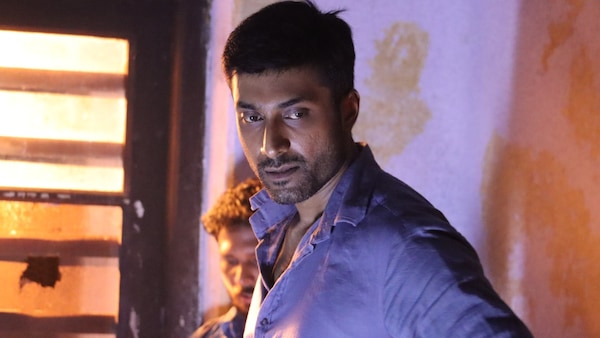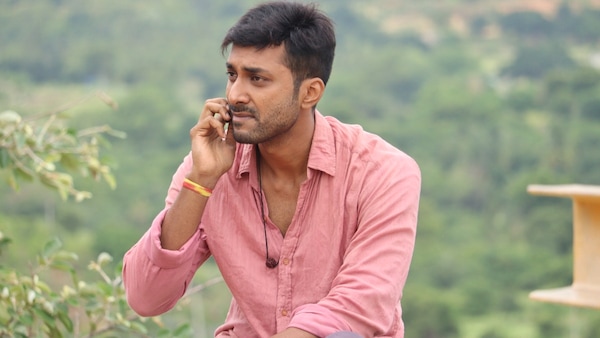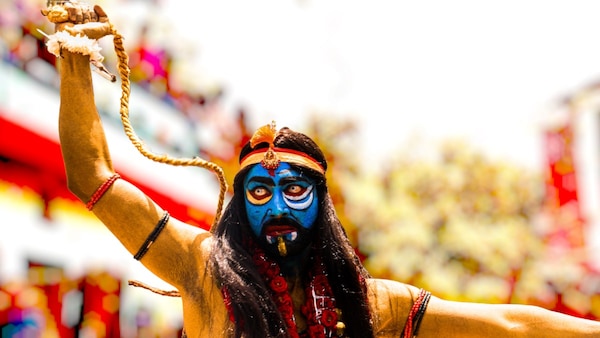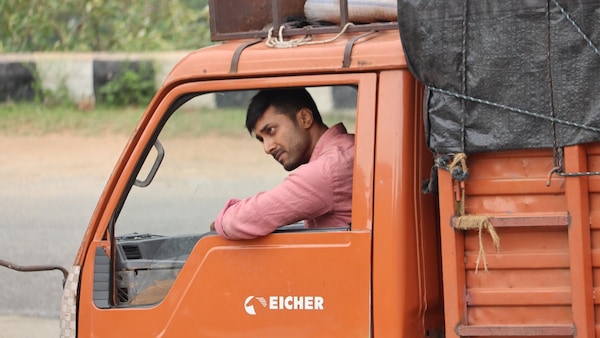Shaitan series: Lead actor Rishi says, ‘I empathise with Bali, but do not agree with the violent choices he makes’
Bali is Kannada actor Rishi’s first grey character, while the series that drops on Disney+Hostar is the most massy commercial content he’s been a part of.

Last Updated: 12.36 PM, Jun 15, 2023
From theatre to television to cinema and now OTT, Kannada actor Rishi’s making sure that he tries his hand at every medium available to him as an artiste. This week, he is making his OTT debut, when the Telugu web series Shaitan drops on Disney+Hotstar. In an earlier conversation with OTTplay, Rishi had said that he was excited about the project because the character has grey shades, but turns out there’s a lot more to the role. Shaitan is probably Rishi’s most massy, commercial project to date, in terms of the action and violence. He plays the central character Bali, someone that Rishi could empathise with, but not agree with his choice of actions.
Taking the plunge into OTT content
For me, the medium, whether it is theatre, TV, cinema or, now, OTT, is always just a medium; that's it. What is more fascinating or exciting has always been the character and the project. The thing is, if you look at projects like, say, Money Heist or Pablo Escobar and stuff like that, they all have cult characters, right, which probably have much higher penetration than any other film. That's also because these are larger-than-life characters, and the conflict points that are addressed in the show are relatable and relevant across the globe. That's what makes it globally viable content
Shaitan is a bloody mass project; it can't get more mass than that. There is a lot of heroism in it. The character is very relatable and relevant to our local milieu. I saw Shaitan as something that has a huge global appeal, but also has a lot of big screen elements. In fact, I was telling our director that this is a project meant for the big screen and asked if he would consider taking it to theatres as, maybe, a two-part film. I thought it has all the massy elements that would probably pull in the younger crowd that wants to see such excitement onscreen. This is the main reason why I was excited about being a part of Shaitan.
Having said that, I must add that since I have done television too, I have experienced audiences from both worlds. A realization that I have always had is that television probably has the highest penetration ever. In cinema, only a big blockbuster will have that kind of reach. The love and reach that one gets on television is probably unparalleled compared to cinema - anybody who has done both television and cinema will agree.

Also, because of the way things have changed so rapidly after the pandemic, OTT has become a big thing and people are watching content in a big way, so that's the way forward. I think we have to adapt to the change very quickly.
The switch from class to mass with Shaitan
Every actor has an image, and audiences people look at the actor with the image that they have in mind. What was exciting for me about Shaitan was not the fact that the role was so different from anything I’d ever done. What excited me was the script and that I would have been ready to do any role in it. Even if it was another police character, I would have definitely done it. But the director wanted me to play Bali, who is the main lead in this tale. There are multiple shades to Bali and to pull that off convincingly, as an actor, was a big challenge. Now, for a role like this, ideally, I would have asked for two months preparation time to get into the psyche of the character or the world of it. Here, I was given 10 days’ time. The role was complex and that excited the actor in me as something that I'll have to crack. Also, the language is not native to me. I had to learn Telugu. Shaitan has a lot of violence, but everything in the script has a purpose; it is thought out so you know that you are doing something sensible that would keep you interested as an actor.
Shaitan is not like Dandupalya

After the trailer came out, there were some remarks that the visuals looked like the story of the Dandupalya gang, but there are no similarities. This is a story about a normal family and their fight for survival. They're not criminals, they're not psychopaths or the kind who want to do crime just because they're getting fun out of it. They're just fighting for their own survival. Shaitan is about a family from a lower-strata of society, for whom everything is about survival.
The language of Shaitan
The trailer had a fair share of language that might be considered crass, but the show is not filled with expletives and stuff like that. There are expletives that are said during situations that these characters go through. After the show comes out, when audiences connect to the characters, the story and its progression, everything will seem organic, including the expletives, because these are words that people from that strata use in real life.
Rishi vis-à-vis Bali
As an actor, I do empathise with Bali in a certain way, but do I agree with the choices that he makes? Probably not as Rishi. If I look at the choices that he makes, I might not agree with any of it, because even if injustice is meted out to me, I might still be very patient and, you know, probably not take the revenge mode. But here is a character who thinks the opposite way and when there's injustice, he feels that he has to fight it out aggressively.

My job as an actor is to find answers as to why Bali’s go-to is violence and aggressive revenge, which takes us to the circumstances in which he’s grown up. In the show, we have tried to show it partially because we can't go too much into the backstory, but there is a clear arc about what happened in his childhood and the kind of life that they have gone through, etc., which gives audiences an idea why Bali and his family do what they do.
Going grey
Playing Bali is my first time in a character with grey shade. I think the reason for his actions probably might be justified. But the actions that he chooses are probably questionable that For me, it's a great role, and he’s still the hero.
Liberating experience?
Being an actor is liberating. One thing that I realised after I started acting was that the camera is very liberating. It's like a friend. Some people find it liberating to just take a canvas and start painting. That's like their expression of thoughts. And that's like the friend that they can have a conversation with. And by and large, I think for a lot of us, the camera is a friend, because you have a feeling that it's not judging you. You can do whatever you want and just be yourself, knowing that there's nobody to judge you. So not just for Bali, for me, in fact, the camera is very liberating with any role that I play.
Exploring dark aspects of society
As the man of the house, Bali has to take care of his mother, get his sister married, and provide for his brother – it’s a vulnerable kind of a situation and there are lot of people ready to exploit him and take advantage of this situation. When he is then betrayed, it becomes the starting point for Bali’s transition from being this naive innocent young boy to an antisocial element. In this journey of Bali, Shaitan also addresses some of the darker aspects of society through the prism of this family. The entire show is from the family perspective, which keeps the emotional context in place. You know why it's happening and the idea is not to show whether this family is right or wrong. The show acts as a mirror, to what is happening around us – non-fiction in a fictional world.

